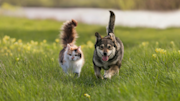Pets and children: ideas to create a safe and happy home for everyone
Embrace winter with your four-legged friend

With its frosty days and sometimes freezing nights, winter can be tough for our pets when the temperature drops.
Whether you're walking the dog in icy weather or watching your cat pick their way through the snow, pet owners will understand the need for extra care as the colder months set in.
To help you enjoy the winter with your much-loved pets, we've put together a handy guide on some of the biggest things to look out for.
Fireworks
Fireworks are popular during Bonfire Night and Christmas, but the crackle, fizz and ear-splitting noises they make can be terrifying for animals.
Cats can hear sounds at much higher frequencies than humans and dogs’ hearing is much more sensitive than ours. Bonfires and fireworks can therefore cause real distress to our pets, so it’s best to be prepared.
Keep dogs and cats indoors if possible, as well as drawing curtains and keeping doors closed. Creating a safe den can also reassure them.
Make sure your cat is microchipped for 2 reasons. Firstly, the shock of fireworks can make them run off and hide. Secondly, sheds and outdoor storage are often in use during garden firework displays, so cats can end up shut away and unable to get out.
If you have a small animal such as a rabbit or guinea pig, normally kept in the garden, consider bringing them indoors too. Do it gradually over a period of a few days as a sudden change may cause more anxiety.
Keeping dogs safe
Steve Mann, a best-selling author and founder of the Institute of Modern Dog Trainers, advises dog owners to remain highly visible to traffic when walking at night, or on a damp and dreary winter’s day without plenty of sunlight. ‘If you’re walking in darkness, wear reflective clothing or use an emergency torch,' he explains.
In snowy weather, your dog may pick up grit or salt on their feet. Mann says to wash them thoroughly to avoid irritation and 'self-grooming' so they don't ingest any debris. 'Stay on top of hairy toes by trimming any long hairs on their feet,' he suggests. 'Hair between the toes has a habit of collecting snow, which in turn forms into little ice balls that painfully lodge between the digits.'
Mann also urges dog owners to be careful if they usually let their pooch off-lead for a gallop. 'During the winter, snow can make everything look and smell slightly different,' he says. 'If you lose track of each other, it could be more difficult than usual for your dog to relocate you.'
Finally, be especially vigilant if you have any rivers or lakes on your walks during the colder months. Mann stresses that frozen water can give your dog 'a false sense of security', and if the ice does crack and they fall in, 'freezing water can inflict hypothermia extremely quickly.'
Keeping cats safe
The advice from leading cat charity Cats Protection is that if the weather becomes particularly cold, keep your cat indoors because they can quickly develop frostbite or hypothermia.
Cats also like the taste of antifreeze, which can leak from car radiators. It's highly toxic to them, so be aware and take them to the vets if they lick it up.
If you have a cat flap, make sure it’s locked at night and cleared of any snow or ice during the day, so your cat is able to come in and out safely.
Festive tips
In the run-up to Christmas and other major holidays, the treats we love to eat and some of our favourite seasonal plants can be highly toxic to cats and dogs.
The RSPCA advises against the following food for pets:
- chocolate
- mince pies (especially toxic for dogs)
- Christmas pudding
- onion gravy
- alcohol
- bones from carcasses (dangerous choking hazard)
Steer your pet clear of holly berries, amaryllis and poinsettia plants, lilies, ivy and Christmas roses as they are poisonous to them.
If they do manage to snaffle the mince pies or ingest a piece of tinsel, call your vet immediately.
Exclusive offers for Co-op Members

Pet insurance
Co-op Members get 5% off pet insurance.
5% discount applies only to the first year as an introductory offer. Minimum yearly costs apply to receive 5% discount: £51.59 for dogs, £50.68 for cats. Offers may be changed or withdrawn at any time.




